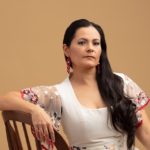Power in an Age of Healing: The Queen of Carthage in Vancouver
- Home
- Features 2020 - 2023
- Power in an Age of Healing: The Queen of Carthage in Vancouver

By Rachel Silver Maddock
A rare female leader in classical mythology, Dido has lived in the contemporary imagination through countless re-interpretations. In many of these, stemming from Virgil’s Aeneid, Dido is presented as a tragic figure who founds the great city of Carthage but later commits suicide when she is abandoned by her lover, Aeneas, the founder of Rome. Dido’s journey has been immortalized through plays, songs, and dances throughout the centuries, perhaps most hauntingly in the aria Dido’s Lament from Henry Purcell’s 1688 opera, Dido and Aeneas.

In a fresh take on Dido’s story, the creative team of The Queen of Carthage (co-produced by Early Music Vancouver and re:Naissance Opera) is digging deep to create a new multidisciplinary production that intersects with contemporary issues.
“Dido is a leader, the creator of a nation, and a woman of colour. She’s not just a woman who falls madly in love and takes her own life,” says Marisa Gold, who is choreographing and performing in the work.
The Queen of Carthage brings together an opera singer (mezzo-soprano Cecilia Duarte), two dancers (Gold and Juolin Lee), and a live eight-piece orchestra in a stage production that re-interprets the emotional journey of Dido in a poetic, non-narrative way. Baroque and contemporary music will anchor the performance but dance is central to engaging the audience in the story — duets and solos that express images or faces of the queen throughout her life.

For Gold, this framing of Dido’s legacy feels both timely and relevant. “This seems to be an age of healing in the world,” she says. The internet and social media have brought us closer than ever to the pain of others, but that awareness presents new opportunities for change. “The way Debi [Wong, one of two stage directors] described it, we look back at the past to reimagine an empowered future. That feels like a message for this work that is super relevant to the times we’re in.”

As she considers the journey of Dido, Gold is uncovering new layers of herself as an artist. A graduate of Simon Fraser University’s dance program in Vancouver and of certificate programs at the Ailey and Graham schools in New York, Gold spent the last eight years working as a dancer, actor, and vocalist in the film industry. Though working in film presents many opportunities, and can be more financially sustainable, Gold says the scheduling — “tumbling” from one job to another — makes it difficult to participate in other performance work.
In the last couple of years, making time for new concert dance and short film projects has been a re-awakening for Gold. “It feels like my heart’s calling — returning to my true form,” she says. Pivoting toward new, meaningful pursuits like The Queen of Carthage, Gold’s experience in the film industry gives her a unique perspective. “My work performing vocally, as a spoken word poet, as an actor, and dancer — all those experiences help me to see different layers of a character in performance as a creator and director,” says Gold. Moving from camera to stage, her understanding of framing and considering audience viewpoint also informs her approach to the work’s choreography and movement direction for Duarte, Lee, and herself.

As part of the creative team assembled by Early Music and re:Naissance Opera seeking to reveal power in vulnerability in The Queen of Carthage, Gold is reclaiming an important layer of creative expression within her practice. “I have a desire to create on a larger scale and expand on my own ideas,” she says. “I feel like I have something to say; it’s emerging from my subconscious and I want to give myself the opportunity to delve into that.”
The Queen of Carthage opens the Early Music Vancouver Festival on July 27.

